President Donald Trump’s job approval rating inched higher in a week dominated by coverage of Hurricane Irma and his apparent willingness to make deals with Democrats on the budget and immigration, according to the latest SurveyMonkey tracking poll.
The survey also shows Trump garnering a net positive rating for his response to Hurricane Irma, an unusual occurrence for a high profile story during the first eight months of the Trump presidency.
SurveyMonkey’s survey of 16,343 adults nationwide conducted from September 8 through September 14 shows Trump’s approval rating ticking up from 40 to 42 percent, and his disapproval percentage down from 57 to 55 percent. This week’s approval number marks a slight improvement from the previous four weeks in which his rating varied between 39 and 40 percent.
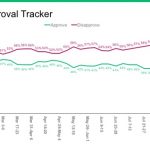
While the President’s approval rating has remained flat among Republicans over the past four weeks, the latest numbers show a five percentage point uptick among independents who lean to neither party.
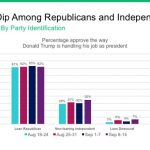
A slightly more Republican sample this week also helps nudge Trump’s approval number higher. This past week, 28 percent of those interviewed identified as Republican, a touch higher than over the past four weeks (averaging 26 percent), but just a single percentage point above SurveyMonkey’s 6 month average (27 percent).
The slight improvement for Trump is also evident in a six-point decline in strong disapproval over the past two weeks, from 48 to 42 percent.
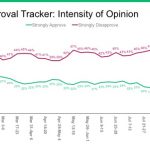
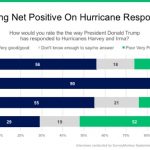
While some of the usual partisan polarization is evident in ratings of Trump’s response to the Hurricanes, Democrats do not show their typically near-unanimous disdain. Better than one in four Democrats (29 percent) give Trump positive marks for his hurricane response. Meanwhile, Trump’s overall approval rating among Democrats remains at just 9 percent.
These results suggest Americans focused more on the humanitarian crisis created by the recent storms than the political debates they create. Americans have been engaged in the story. Nearly all Americans (85 percent) say they’ve been following news about the storms, with almost half (49 percent) saying they have been following that news very closely.
Remarkably, more than half (53 percent) say they have family or friends who had to evacuate from their homes to another location as result of the storm. Exactly half (50 percent) report making a contribution to Harvey or Irma relief efforts.
So far, however, relatively few see the storms as a threat to the U.S. economy. Far more say the economy will stay the same (44 percent) or get better (19 percent) as a result of the storms, while just 35 percent worry that it will worsen.
When it comes to the political debates inspired by the storms, however, the usual political polarization returns in force. Americans are divided right down the middle, for example, on the question of whether the severity of recent hurricanes is most likely the result of global climate change (48 percent) or just the kind of severe weather event that happens from time to time (50 percent).
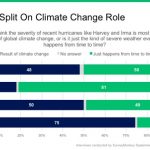
The partisan polarization on this question is remarkably strong. Three out of four out of five Democrats blames global climate change for the severity of the storms, while nearly four out of five Republicans take the opposite view.
These results also represents a marked change from the aftermath of Hurricane Katrina a dozen years ago. Pew Research asked the same question in 2005 and found just 25 percent who believed the severity of Katrina resulted from global climate change, while 66 percent thought it was just a random event.
Any survey is subject to random noise, and this week’s survey is no exception. That said, after a week or so dominated by hurricane news and talk of “deals” with Democrats, President Trump’s ratings remain high with Republicans, while the intense disapproval of those outside his base has ticked down slightly.
Results from previous weeks can be accessed here.
Methodology: This SurveyMonkey Tracking poll was conducted online September 8 through September 14, 2017 among a national sample of 16,343 adults ages 18 and up. Respondents for this survey were selected from the nearly 3 million people who take surveys on the SurveyMonkey platform each day. Data for this week have been weighted for age, race, sex, education, and geography using the Census Bureau’s American Community Survey to reflect the demographic composition of the United States. The modeled error estimate for this survey is plus or minus 1.5 percentage points.
The questions on reaction to hurricanes Harvey and Irma were part of the same survey and asked September 13 through September 14 among 2,648 adults ages 18 and up. The modeled error estimate for these results is plus or minus 3.0 percentage points.



